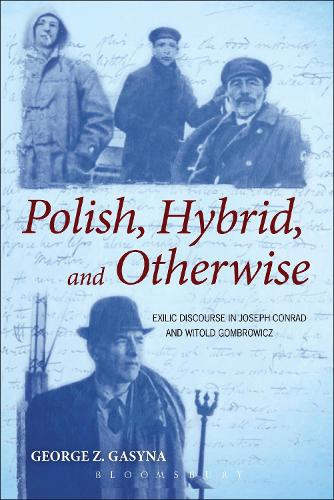
Polish, Hybrid, and Otherwise: Exilic Discourse in Joseph Conrad and Witold Gombrowicz
(Paperback)
Available Formats
Publishing Details
Polish, Hybrid, and Otherwise: Exilic Discourse in Joseph Conrad and Witold Gombrowicz
By (Author) Dr. George Z. Gasyna
Bloomsbury Publishing PLC
Bloomsbury Academic USA
18th April 2013
United States
Classifications
Tertiary Education
Non Fiction
Literary studies: c 1900 to c 2000
823.912
Physical Properties
Paperback
288
Width 152mm, Height 229mm
395g
Description
Polish, Hybrid, and Otherwise examines the triple compact made by displaced authors with language, their host country, and the homeland left behind. It considers the entwined phenomena of expatriation and homelessness, and the artistic responses to these conditions, including reconstructions of identity and the creation of idealized new homelands. Conrad and Gombrowicz, writers who lived with the condition of exile, were in the vanguard of what today has become a thriving intellectual community of transnationals whose calling card is precisely their hybridity and fluency in multiple cultural traditions. Conrad and Gombrowicz's Polish childhoods emerge as cultural touchstones against which they formulated their writing philosophies. Gasyna claims that in both cases negotiating exile involved processes of working through a traumatic past through the construction of narrative personae that served as strategic doubles. Both authors engaged in extensive manipulation of their public image. Above all, Conrad and Gombrowicz's narratives are united by a desire for a linguistic refuge, a proposed home-in-language, and a set of techniques deployed in the representation of their predicament as subjects caught in-between.
Reviews
"Skillful and sophisticated, this comparative study challenges the customary readings of Joseph Conrad and Witold Gombrowicz. These two major representatives of modernity and postmodernity are usually perceived within the paradigm of migr writers seeking acceptance as narrators of tales in a new milieu. Gasyna argues that the two writers created for themselves hybrid identities in language, thus proclaiming their autonomy from their country of origin and from their new homelands. He posits that they are masters of language rather than tellers of tales. Gasyna's bold theorizing is quintessentially postmodern and stimulating." -- Ewa Thompson, Research Professor of Slavic Studies, Rice University, USA
"Polish, Hybrid, and Otherwise is a timely and much needed contribution to twentieth-century comparative studies. One of book's main strengths lies in its erudition and its ambitious scope, as the project brings together literatures that have been rarely studied together: it situates Slavic literatures in the broader comparative context of Anglophone, Francophone and postcolonial studies. Its second strength lies in the bold thesis that proposes the literature of exile and contact as the dominant paradigm of twentieth-century literature. What distinguishes this project from other studies of exile is the fact that it is not limited to the study of content alone but elaborates an original heterotopic poetics of exile, its hybrid narrative forms, intertextual strategies, as well as its ethical/political importance." -- Ewa Plonowska Ziarek, Julian Park Professor of Comparative Literature, University at Buffalo, The State University of New York, USA.
Author Bio
George Gasyna is Assistant Professor in the Department of Slavic Languages and Literatures and the Program in Comparative and World Literature at the University of Illinois at Urbana-Champaign, USA. He specializes in Polish literature, in particular 20th-century prose and drama, as well as exilic literature and the avant-garde.
